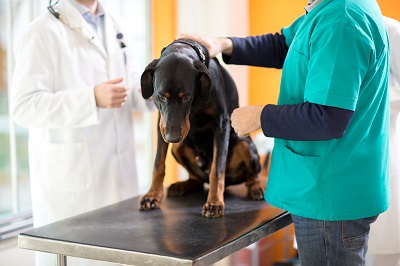Dog Cancer: 10 Signs to Look Out for in Abilene, Texas
Dog cancer is more common than people realize. Read on to learn about the ten signs of dog cancer to look out for in Abilene, Texas.
Six million dogs are diagnosed with cancer every year. That means, if you're a dog owner there's a chance you'll have to deal with that someday.
Because of this, it's important to know the signs of cancer. So do you know them? If not, you've come to the right place.
Some cancer symptoms might be signs of something else, but if you see these, a visit to the vet is worth your time.
Ready to get started? Here are ten signs of dog cancer you should know about.

1. No Appetite
Have you noticed a drop in your pet's appetite? While that isn't an automatic indicator of cancer, it is a related symptom.
Why might cancer cause your dog to lose his appetite? There may be a mass inside his intestines. The feeling of that mass in there may make your dog unwilling to eat.
To catch a change in appetite, keep a close eye on your dog on a regular basis. That way, you'll notice when something is off.
2. Strange Growths
As with loss of appetite, unexplained growths aren't always cancerous. But, they're a sign you definitely don't want to ignore.
Any growths you see that don't look normal should be checked out by your vet. These might be tumors, or they might be something less dangerous.
If your pet has bumps or growths, make sure you check them regularly. Older dogs, in particular, are prone to having them pop up.
3. Loss of Strength
If your dog is usually perky and excited all the time but hasn't been lately, he may have cancer. This may particularly present itself in the form of collapsing.
If your dog collapses, always get them checked out. They might act find later, but that doesn't mean the problem went away.
Lethargy and other forms of weakness indicate that something might be up, too. Better safe than sorry, so don't hesitate to contact your vet.
4. Sudden Weight Loss
It's estimated that 56% of dogs are overweight. But that doesn't mean they should shed those pounds overnight. A healthy regimen can help them lose unneeded pounds over an appropriate period of time.
Your pet shouldn't lose a bunch of weight out of nowhere. If you notice sudden weight loss in your dog, there's definitely something going on that shouldn't be.
Quick weight loss could be due to an intestinal tumor.
5. Prolonged Coughing
Coughing is pretty common in some breeds of dogs. Smaller ones, in particular, may have this issue. A cough here and there isn't a major concern, but coughing that continues is.
Prolonged cancer may mean your dog has lung cancer. No, it doesn't only happen to smokers.
If your dog has been coughing more than usual, go ahead and take him for a vet visit to see what's going on.
6. Non-Healing Wounds
Your dog is bound to get a wound here and there throughout his lifetime, especially if he doesn't spend all his time in your living room. However, these wounds should heal with proper care and time.
If your dog has a wound that doesn't seem to be healing, it might be a sign of cancer. The cells in the wound area may not be growing correctly, which might hinder healing and contain cancer.
7. Changes to Your Dog's Mouth
How often do you check your dog's mouth? Do you know what it normally looks like? If not, it's time to start checking.
Mouth changes can be a sign of cancer. What do we mean by that? These changes may include the presence of a lump, weird smells, or the gums changing color.
Each of these issues is a sign that cancer might be present. Check now, so you don't find out that your dog has an oral tumor later. The earlier you can spot problems, the better.
8. Eating Is Difficult
You might notice that your dog still has an appetite but that he's having a hard time swallowing or eating. This might means there's a lump in his neck.
If you regularly watch your dog eat you'll notice a difference when it happens. If your dog looks like he's struggling to eat compared to his usual eating style, call your vet and set up an appointment.
9. Bleeding From the Nose
Your dog shouldn't get nosebleeds. That's an issue more often faced by human beings. If your dog has a nosebleed and he's older, he may have cancer.
As with other cancer-related symptoms, this is more of an issue if you see it in an older dog. It's easy to think that a simple nosebleed isn't a sign of something significant, but it could be.
10. Trouble Getting Waste Out
Urinating and defecating shouldn't be difficult for your dog. If it seems like he is in pain or if you see a persistent or worsening amount of diarrhea, something is going on.
Occasionally check your pet's stool and urine for blood. And the constant need to "use the bathroom" is a sign that something's up as well.
Don't Ignore These Signs of Dog Cancer
Just like it is with people, there are many ways for your dog to get cancer. Various parts of the body can be affected and in varying intensities.
Dog cancer is a bigger issue than many pet owners know, so stay ahead of things and look for symptoms before they begin. The better you stay on top of your pet's health, the better off he'll be.
Have you seen any of these symptoms in your dog lately? Contact us today to get him checked out. We'll help you find the medical direction or peace of mind you need.












